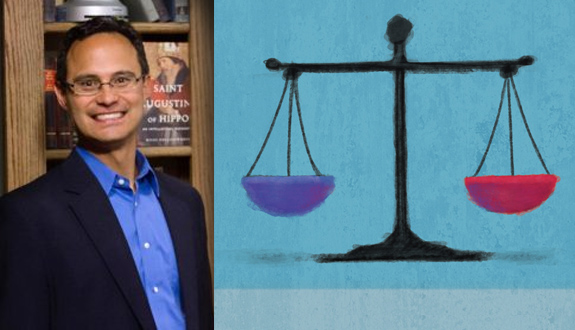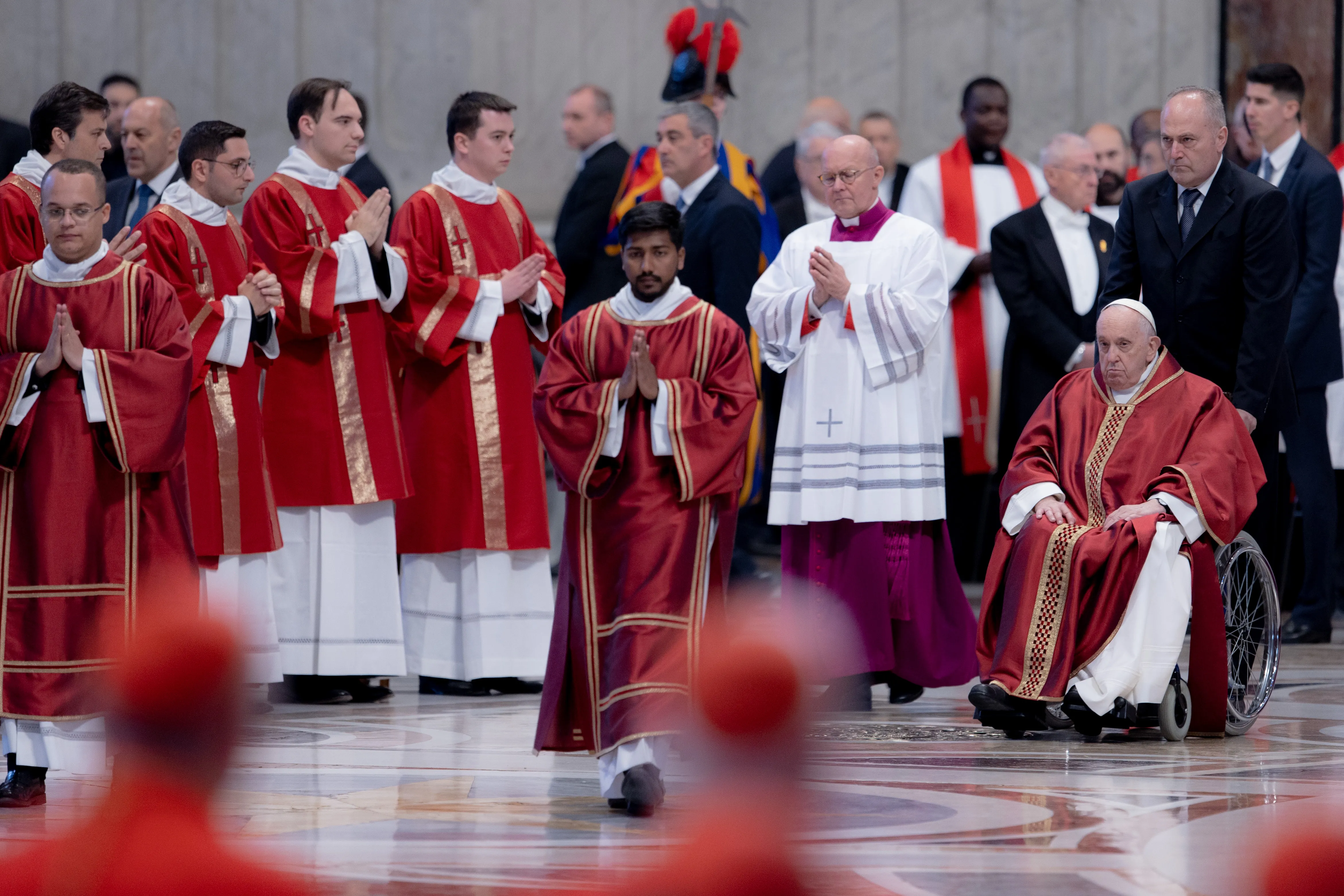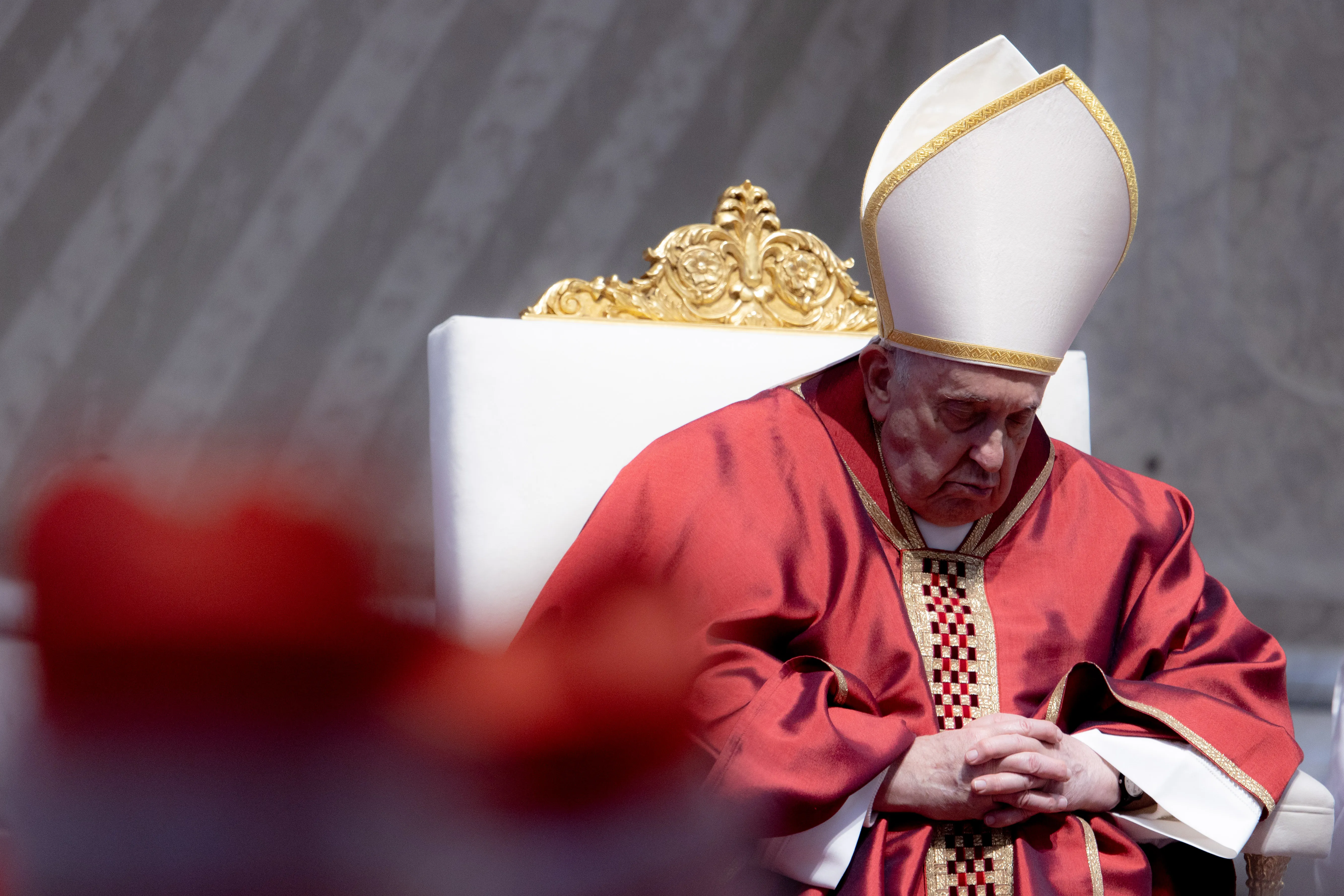
In his homily for the Mass to open the conclave which would ultimately elect him pope, Cardinal Joseph Ratzinger decried the onset of what he termed the “dictatorship of relativism.” The fight against relativism became one of the signature priorities of Pope Benedict XVI’s papacy.
A new book by Dr. Edward Sri, who is a professor of Theology and Scripture at the Augustine Institute, aims to give Catholics the tools to combat that dictatorship of relativism, and make them confident in objective moral truth. The book, Who Am I to Judge? Responding to Relativism with Logic and Love (Ignatius Press/Augustine Institute, 2016), is the most recent effort by Dr. Sri, who is author of several best-selling books and host of the acclaimed film series Symbolon, and is the fruition of many years’ prayerful work.
Dr. Sri recently spoke with Catholic World Report about his book and how Catholics are called to share the truth with loving compassion.
CWR: Is the title a reference to those famous words of Pope Francis?
Dr. Edward Sri: Everyone always asks me about the connection with Pope Francis on the title. I love this title, and I chose the title because it gets right to the heart of the matter very quickly. I wanted a title that just immediately hit people where they’re at. A lot of good people have a sense that there really is a right or wrong, but they’re afraid, so afraid to say anything is right or wrong, because they’re afraid of offending someone, they don’t want to hurt someone, they want to be a loving person; and they think somehow, if I make a judgment that this is right or this is wrong, that I’m not being loving to other people. Or they’re afraid of what other people are going to think of them. So that’s why I chose the title.
That being said, as you know many people took Pope Francis’ words out of context in the popular media and I’m very happy to take those words back from the media and clarify what Pope Francis really meant.
CWR: You touch on this a bit in the book. When did you realize just what a big problem this dictatorship of relativism is?
Dr. Sri: My own college experience, going to a big state university, where I was surrounded by this, whether it was my professors in the classroom or my peers on campus, this is just the assumed worldview and it raised many challenges for my own personal faith life when I was constantly being asked “Why do you guys believe this? Who are you to tell people what’s right or wrong? Why is the Catholic Church so judgmental?” I mean, I was hearing that back in my university days.
But it really hit home – and I write about this at the very beginning of the book – when I had to teach university students. I was teaching a class at Benedictine College, which is known now as a great, vibrant Catholic school. At the time I probably had people in this moral theology class where 90% of the people were just taking it to get a religious studies requirement done. So it’s not like they really wanted to be there. And I knew that these young college students, many of them were shaped by the relativistic culture around them. And if I started jumping in on the Church’s moral teaching on a particular matter without providing a framework they are immediately going to say “Well who are you to judge? Who is the Church to say what’s right or wrong?” because they are assumingrelativism.
I knew that I had to step back and present a very different vision for looking at the moral life – which is a Catholic moral vision, going back to great heroes like Aquinas, and even some of the pre-Christian Greek philosophers like Aristotle have a lot to offer and it was stepping back and presenting the key features of that authentic moral world view that, I think, won people over to be open at the end of the semester to the tough moral teachings. But first we had to talk about virtue, what is life all about, what brings happiness. Those fundamental points had to be brought up first.
CWR: In the book you recount a personal story in which you pointed out to your relativist roommate the contradiction wherein relativism claims that it is absolutely true that there is no absolute truth – and his response was “Oh yeah, I guess you’re right!” but he didn’t end up changing his ways.
Dr. Sri: Yeah, I think we have to realize that it’s not enough to just appeal to the mind and give intellectual arguments. We have to do that, I want to be clear – we have to appeal to the mind. But we can’t just give a quick three-point apologetic argument and expect to win over our relativistic friends. I think that’s the main point. There’s no quick elevator speech, because so many people just assume relativism. It’s not even something they’ve really thought about; they just assume that everyone makes up their own morality, and everyone decides for themselves what is right or wrong, and you’re a really bad person if you think there is objective moral truth out there. So that’s why you have to step back and engage at a much broader level.
CWR: Where did the idea for the book come from? And how did it go from the idea, to the writing, to the publishing?
Dr. Sri: This has been an idea I’ve been thinking about for almost two decades. From teaching, originally, for these college students in a classroom, seeing the impact it was having on young people’s lives. I started taking it to FOCUS [Fellowship of Catholic University Students] – I work with FOCUS – and so we started teaching this with college students around the country. Everything that was appealing for the young people was also going to be very helpful for adults who struggle with this as well. Doing seminars on this topic around the country, I was seeing the fruits of it. I started writing articles on this topic – I knew I always wanted to write a book on it, and I finally had time last year to work on it. And I think the part about the book that I’m getting the most feedback on is the middle section, the “Seven Keys for Responding to Relativism.” What I’m trying to do there is not give a three-point apologetic argument, but more “What are the key attitudes and overall approaches that we just should take when we’re talking with our relativistic friends and family members and loved ones?” Those are the things that I’m hopeful will really bear a lot of fruit for people’s lives.
The section where I talk about the difference between making a judgment and judging someone’s soul – I just gave a talk to a large group in Florida on this topic, and so many people came up to me after and said “Thank you so much, that was so helpful, I had never thought of it this way,” and it’s a really basic point. But I think they are so beaten down by the culture, they are afraid to say anything is right or wrong! It’s so funny how our secular friends who maybe don’t read the Bible that much are often quoting one verse back to us Christians, and that’s what Jesus said in the Sermon the Mount: don’t judge. Yes, he did say that, but the Bible uses the word “judge” in many different contexts. Jesus says don’t judge, and the context there is about judging someone’s soul. We can’t play the role of God; someone’s spiritual status before God, whether they go to heaven or hell, is between them and God alone. I may see a certain moment in someone’s life, but I don’t see the whole story. That’s God’s job.
That doesn’t mean we can’t judge people’s actions. God gave us a mind, he wants us to use it, and the Bible even uses the word “judge” in other contexts. “The spiritual man judges all things,” Paul says in 1 Corinthians. If it’s raining, I can make a judgment to take an umbrella – I’m not a mean bigot if I do that. Or if I see my toddler running into the street, I can make the judgment that that’s not good for her! I’m not judging her soul or saying she’s going to hell, I’m just making a judgment. And I could do that about the promiscuous college student, that that’s not good for her; she’s not going to be happy, she’s not going to find the love she is looking for. Or if a friend of mine is struggling with alcoholism, I might make a judgment in my mind that that’s not good for him. Or if a married man leaves his wife and kids and runs off with another woman, I can use my mind to make a judgment that that’s not good for him.
And so we need to start loving people by being able to share what is right or wrong. And what’s sad about moral relativism is it divides us, it prevents us from really authentically loving the people God has placed in our lives. Instead of sharing with them a better way, helping them with their troubles, we just say “Oh well. I wouldn’t do that, but if you want to ruin your life, that’s fine for you. That’s simply not love!” If I have an alcoholic family member and I don’t say anything, I simply let him ruin his life, am I really loving him? No!
I hope this book is going to help people love others more by not cowering to the culture of moral relativism.
CWR: How do you hope that people will be able to use this book in a practical way to combat relativism?
Dr. Sri: My main hope is that this book will give Catholics confidence that there really is moral truth, and practical ways to share this truth with other people. They don’t have to compromise their convictions to still be compassionate people and be friends with people they disagree with. I want to help people in parishes, I want to help priests, and deacons, and parish leaders form their parishioners in the Catholic moral worldview. There are so many programs in parishes that are there for sacramental preparation, adult faith, bible study, but when I talk to pastors and parish leaders and ask them what they are doing to form people in a Catholic moral worldview and help them rise up moral relativism, they all admit “We’re not doing much – we need resources, we need help!” Well, here’s this book that I hope will be a great tool in the hands of many priests, deacons, religious, and parish leaders, and they can use that to impart an authentic Catholic moral worldview to their parishioners who are being so swayed by the culture around them.
I’m also thinking a lot about parents. This can be a great book for parents, to equip them to talk to their children about the great moral issues of our time, to think with the mind of the Church, not the mind of the relativistic culture.
And then just the average individual out there who might be confused – someone who has a brother who thinks the Church is just a bunch of bigots, or whose friend is living in a homosexual relationship – and they want to be loving, but not compromise the truth.
These are very sensitive issues. And what I’m trying to do in the book is strike the right balance that I hope Jesus would bring of, on one hand total love and mercy and compassion for people that are coming from a different perspective and living different lifestyles, but also a call to conversion, a call to the truth. Too often we separate truth and mercy, truth and compassion – we have to say No, they go together.
I cannot approach my family members and friends simply with the hammer of truth; I’ll drive them away or discourage them. They need to know the larger story of God’s love, his mercy, and get a sense that I authentically love them. And at the same time I’m called not to just love them but never talk about truth – that’s not love. That’s what Jesus does: he comes not with condemnation, but with love. But, like the woman caught in adultery, he loves her so much that he doesn’t just leave her there. He says “Go and sin no more.” That’s the balance we as Christians need to strike in our world today.
CWR: Is there anything else you’d like to add?
Dr. Sri: On page 129 of the book there is a little dialogue about what to do when your friend says “Don’t be so judgmental? Why is the church so intolerant?” We can come right back and say “Excuse me, are you judging me?” People are really finding that helpful because our relativistic friends assume relativism is just right, and that that’s an objective, neutral position. We have to come back and say no, it’s not. This helps us do that.
If they say “You shouldn’t be telling other people what’s right or wrong,” then right there you’ve got a chance to have a good dialogue and say “Well, excuse me, my friend, it sounds like you may not believe that there is a moral truth, that everyone decides for themselves what’s right or wrong; you have freewill, you’re free to believe that, but whatever you do, please don’t impose your faith in relativism on me. That doesn’t make any sense to me.”
Then start asking them questions. “Do you really think your relativism makes sense?” Let them defend relativism. Then start asking them questions. “Is rape ok? If somebody says ‘Well, for me rape is ok,’ does that make it ok? Or ‘For me, kidnapping children is ok,’ does that make it ok?” We Christians are too often on the defensive, having to explain; let’s start asking them questions about their worldview. I think they’ll feel they are skating on thin ice, and they’ll be more open to the Catholic way of looking at things.
Hopefully the book will really equip people to share the truth in love.
If you value the news and views Catholic World Report provides, please consider donating to support our efforts. Your contribution will help us continue to make CWR available to all readers worldwide for free, without a subscription. Thank you for your generosity!
Click here for more information on donating to CWR. Click here to sign up for our newsletter.









I do not agree, read:
https://www.catholicmatch.com/institute/2014/02/36-top-resources-for-catholic-dating-marriage/
Sincerely, Toccara
new dictatorship. very interesting